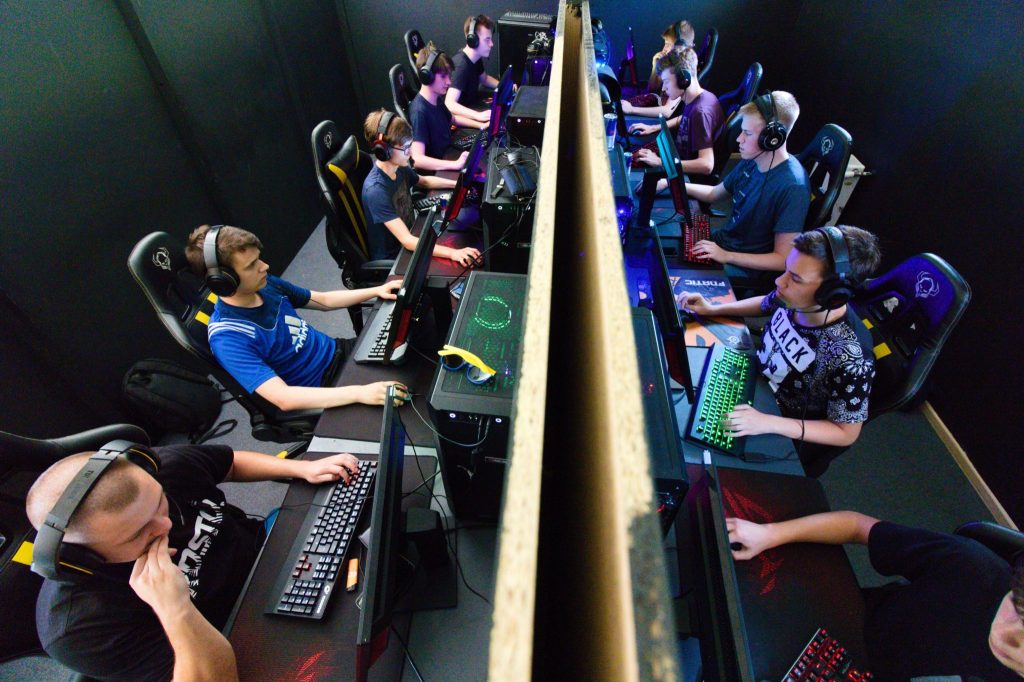Esports Tournaments have become the driving engine of modern gaming culture, turning passionate players into global icons and bringing millions of fans together in virtual stadiums. What began as casual LAN parties in the early 2000s has evolved into an international spectacle, where digital athletes compete for fame, sponsorships, and life-changing rewards. The industry’s rapid climb, supported by technological advancements and professional infrastructures, now mirrors traditional sports in scale, passion, and professionalism. Following EEAT principles—Experience, Expertise, Authoritativeness, and Trustworthiness—this article dives deep into the realities and growth of esports, bringing verifiable insights, real-world stories, and data-backed evaluations of this digital phenomenon.
The Rise of Competitive Gaming on the Global Stage
The roots of Esports Tournaments trace back to small gatherings in game arcades and university halls. Titles like Counter-Strike, StarCraft, and Quake laid the foundation for what would become a structured global industry. As internet speeds improved and streaming platforms flourished, competitions moved into massive arenas, watched by millions live on platforms like Twitch and YouTube Gaming.
By 2025, esports events fill major venues such as the Staples Center and Seoul’s Gocheok Sky Dome, with attendance rivaling football and basketball finals. The live-viewership intimacy, where fans can interact directly with professional players, creates a personal connection that traditional sports miss. The evolution wasn’t accidental—it was driven by years of community building, broadcast innovation, and technology that made online play accessible to anyone, anywhere.
Inside the Structure of Modern Esports Tournaments
Professional competitive events follow complex organizational structures designed to maintain fairness and global representation. Teams qualify through regional circuits, accumulate points in seasonal rankings, and progress to international finals. Game publishers like Riot Games, Valve, and Activision Blizzard have introduced franchise leagues ensuring stability for organizations and secure income for players.
A typical event includes open qualifiers, group stages, playoffs, and grand finals streamed in multiple languages to global audiences. Viewership numbers often surpass traditional media broadcasts, indicating the cultural shift toward digital-first entertainment. These tournaments don’t simply reward skill but discipline, mental stamina, and coordination—traits shared with elite physical athletes.
Real-World Success Stories from Pro Players
The essence of Esports Tournaments lies in the human stories behind every victory. Consider the journey of Lee “Faker” Sang-hyeok, who rose from local internet cafés in Seoul to become one of the most decorated League of Legends players in history. His focus, adaptability, and ability to reinvent playstyles made him a global symbol of esports excellence.
Similarly, players like Oleksandr “s1mple” Kostyliev from Ukraine transformed the Counter-Strike scene with their technical brilliance and consistency under high pressure. These figures exemplify the industry’s professional maturity—where years of dedication can lead to legitimate athletic recognition and financial success. Their stories aren’t just about playing games; they’re about mastering human endurance, discipline, and team synchronization.
Economic Power and Brand Investments
The economic landscape surrounding Esports Tournaments is built on sponsorships, media rights, merchandising, and fan engagement. According to industry analytics in 2025, the global esports economy surpasses $3 billion annually, driven by major brands entering the space with long-term partnerships. Corporations like Intel, Red Bull, and Logitech invest millions to align their products with top-tier tournament visibility.
This influx of sponsorship funds has professionalized player salaries, with many top performers earning in the seven-figure range annually. Gaming organizations now function like professional sports franchises, employing analysts, fitness trainers, nutritionists, and psychologists to enhance performance. The inclusion of structured contracts and wellness programs reflects the industry’s emphasis on sustainable careers rather than short-lived fame.
The Role of Broadcasting and Fan Engagement
Without an audience, competitions would be meaningless. The rise of interactive broadcasting platforms has revolutionized how fans engage with live events. Multiview options, real-time chat integration, and augmented reality replays enable spectators to analyze every move as though they were part of the match itself. (Esports Tournaments)
Digitally, tournaments extend beyond the screen into fan meetups, creator collaborations, and social media challenges. This engagement loop builds community loyalty—fans don’t just watch matches; they participate in the culture. The combination of accessibility, competitive tension, and storytelling makes esports one of the most emotionally charged sectors in media entertainment.
The Role of Game Publishers and League Design
Behind every successful competitive ecosystem stands a careful balance between publishers and players. Game developers like Riot Games with League of Legends and Valve with Dota 2 maintain direct involvement in their esports scenes. They manage tournament schedules, distribute prize pools, and ensure gameplay integrity through regular updates. (Esports Tournaments)
Publisher-driven tournaments encourage consistency, while open-circuit models, like Valve’s approach, foster community creativity. Both systems have merits. Franchised leagues offer economic stability, while open competition keeps grassroots energy alive. Either way, the shared goal remains the same: creating compelling, fair, and high-quality gaming entertainment for a worldwide audience.
The Social and Psychological Side of Esports
For professional competitors, success requires more than mechanical mastery—it demands psychological resilience, focus under stress, and emotional intelligence. Mental fatigue and burnout are genuine risks in high-stakes Esports Tournaments. The constant need to perform can take a toll on personal well-being.
Top organizations implement esports psychology programs to build emotional balance, teaching breathing techniques, focus exercises, and team communication strategies. These mental training sessions parallel the support systems in Olympic-level sports, showcasing that professional gaming is as demanding mentally as traditional athletics.
Socially, esports has become an inclusion platform—transcending ethnicity, gender, and geography. Young players from remote areas can compete at international levels without facing economic or physical limitations common in traditional sports. (Esports Tournaments)
Technological Innovation and Fair Play
The backbone of esports is technology—the servers, analytics, and broadcast tools ensuring precision and fairness. Robust anti-cheat mechanisms, real-time latency adjustments, and instant replay systems protect integrity. Artificial intelligence assists organizers in identifying patterns of unfair advantage or suspicious behaviors. (Esports Tournaments)
High-level tournaments use advanced analytics to enhance performance evaluation. Heat maps, reaction-time trackers, and communication metrics allow coaches to refine micro-decisions that determine victory or defeat. These innovations are redefining what it means to analyze digital sports at a professional level, giving both players and audiences unprecedented insights into gameplay science.
Educational and Career Opportunities in Esports
Esports is no longer just a hobby; it’s a legitimate career path recognized by universities and governments worldwide. Hundreds of college programs now offer scholarships and degrees in esports management, broadcasting, and game design.
Students competing in collegiate Esports Tournaments gain leadership, teamwork, and problem-solving skills transferable to any industry. Institutions invest heavily in building esports arenas on campus, integrating gaming into their educational culture. This legitimization of gaming as both an intellectual and creative pursuit has been key to its long-term sustainability.
The Future of Esports Infrastructure
By 2025, dedicated esports arenas are being built across major cities, hosting both regional and global competitions with multi-million-dollar production setups. Enhanced VR integrations allow fans to sit courtside digitally, blurring lines between virtual and physical viewing experiences.
5G connectivity has also expanded the mobile esports scene, opening new markets in developing countries. Competitive titles like PUBG Mobile and Mobile Legends dominate Southeast Asian tournaments, making mobile platforms an essential growth engine for the entire sector. (Esports Tournaments)
Blockchain integration and NFT ticketing systems are beginning to reshape how fans own digital collectibles tied to championship moments. Verified ownership, instant resale, and limited-edition access are becoming powerful tools in fan monetization and engagement.
Expert Insights and EEAT-Based Analysis
Industry experts emphasize that the success of Esports Tournaments depends on balancing growth with integrity. Leading analysts from gaming institutions highlight the need for consistent regulations across regions, ensuring ethical transparency in prize distribution, sponsorships, and player welfare.
EEAT parameters—Experience, Expertise, Authoritativeness, and Trustworthiness—anchor credibility in esports journalism and analysis. Experience ensures firsthand understanding of gameplay intricacies, while expertise legitimizes technical breakdowns. Authoritativeness arises from collaborations with verified professionals, and trustworthiness is maintained through transparent reporting and factual accuracy.
Through these standards, esports coverage moves beyond hype—it educates audiences, informs investors, and builds confidence among fans who want validated, insightful, and responsible content. (Esports Tournaments)
Read also:
wheon gta 5
cricket 07 wheon.com
skillmachine
wheon.com gta vice city
srivalli song lyrics in hindi
a mere watan ke logo lyrics
manasilayo meaning

